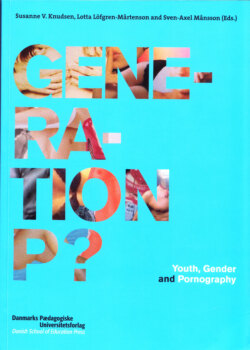Читать книгу Generation P? - Группа авторов - Страница 24
На сайте Литреса книга снята с продажи.
Mainstream sexualisation – Backlash or experimentation By Wencke Mühleisen
ОглавлениеIt’s possible to fuck with friends. And make friends with the one you have fucked.1
(Åse Brandvold and Maria Børja)(2006)
Sexualisation, which characterizes the entire spectrum of cultural expressions, from popular to avant-garde, was identified in the 1990s (McNair 1996). Sexualisation as a broad mainstream cultural trend is a specific late modern and neoliberal construction. Sexuality, previously confined to the private sphere or to low culture – with pornography as its extreme point and limit – has gradually entered into all quarters of the public sphere. This pervasive presence of diverse representations of sexuality in culture and media and the significance and consequences of that presence together constitute a much discussed issue in feminist academic debate and most certainly in public debate.
I want to investigate the critical interpretations of mainstream sexualisation. To achieve this, I use interpretive trends of feminist academic debate as a context for the analysis of one specific media-debate that recently took place in Norway. In feminist academic debate in the Scandinavian countries (Norway, Sweden and Denmark), mainstream sexualisation is predominantly perceived as an unambiguously commercial, depoliticized phenomenon. In Anglo-American feminist academic debate, on the other hand, there exist additional interpretations of mainstream sexualisation that identify feminist experimental representations about sexuality in mainstream culture. I want to question the presumptions of sexualisation as part of a general antifeminist backlash. Since the 1960s, Scandinavia is characterized by the ideals of sexual liberation, genderequality and welfarestate-model. Then, in late 1990s, a representational trend of new-feminist discourses in media and culture was added. This Scandinavian contextual specificity has not resulted in interpretations of mainstream sexualisation that differ substantially from the presumptions of anti-feminism.
I argue in favour of interpretations of mainstream representations of sexuality that seek to complicate and destabilize dualisms between critique and entertainment, and between academic and popular culture. I want to analyze the critical reception of the new-feminist Norwegian anthology Rosa Prosa. Om jenter og kåthet (Pink prose. On girls and horniness) as an illustrating case of the public debate about sexualisation (Roggen & Tornes (Eds)(2006). The anthology as a whole represents a subjective examination of sexuality from the perspectives of a new generation of feminists. The critical evaluations of this book centre on three main chains of argument. The first chain of arguments relates to the dualism between the repressive and the subversive and analyzes mainstream sexual representations as part of apolitical consumerism. The second chain of arguments characterizes individual and autobiographical discourses about sexuality and subjectivity as a banal romanticism of liberation. And the third chain of arguments criticizes the focus on the sexual, the personal and the private as a neo-liberalistic aberration of the feminist project.
